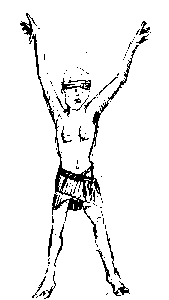 |
|
 |
||||||
Politics: |
||||||
[This rant dates from before Bush's invasion of Iraq redefined his presidency.] Is George W. Bush a communist? Time was that the communists were idealists and the conservatives were pragmatists. The communists talked of a global family of sharing and equality. They appealed to the heart and to the imagination. Wouldn't it be a better world if we all shared our wealth with each other, they asked, from each according to their ability, to each according to their need? Who could argue with that? The conservatives, on the other hand, talked about business. They said that selfless sharing was impractical. Self-interest is paramount in guiding human behavior, and a system (such as communism) that tried to reduce self-interest in favor of a global concern for one's fellow humans was doomed to failure. Given that self-interest (you might prefer the term "greed") is ubiquitous and inevitable, society should be structured such that acting in one's own interest helps rather than hurts the society. That's the ideal free market society, where I work hard for my own profit, but that hard work generates wealth, increasing the supply of wealth, and thus driving down wealth's price and making wealth more easily available in general. Indeed, the conservative opposition to the communist ideal even took on Christian significance. Since human nature is corrupt and irredeemable by any mortal means (see Genesis), a system (such as communism) that hoped to perfect human nature was doomed to failure. Indeed, such a system was heresy. The contrast between idealistic communism and pragmatic free market society played out not only between rival political groups but within the political development of many individuals (including my own). Young, idealistic liberals often become more appreciative of the free market as they gain experience with economic theory, work, and pay. A stint in a volunteer organization, where people are expected to work out of duty and compassion rather than for pay, often helps one see the value of the wage incentive. But now it's George W. Bush's turn to be the impractical idealist, the one who believes in solving social crises through improving human nature, the one who touts voluntary sharing over reliable self-interest. In his vision for the US, well-to-do citizens will come to the inner city and love the disadvantaged inner city children not because the government forces them to do so but because it's what they want to do. He sees volunteers and philanthropists, not government programs, as the way to solve poverty and powerlessness in the US. His call for a compassionate nation of volunteer philanthropists is the communist's appeal to the heart and the imagination. Wouldn't it be a better nation, he asks, if we slashed impersonal welfare programs and instead all shared our time and wealth and knowledge with each other voluntarily? The pragmatic analysis, that it's soft-headed to rely on personal good will to ensure that the poor have health care, good schools, and job opportunities, is cast aside in favor of the happy dream of good people doing good for goodness' sake. —JoT See also my Bush thread (In the News) responses to "Bush"
top |
||||||